
This source discusses the purpose of research writing.
- Subject:
- Composition and Rhetoric
- English Language Arts
- Material Type:
- Textbook
- Provider:
- LibreTexts
- Author:
- Athena Kashyap
- Erika Dyquisto
- Date Added:
- 06/28/2023

This source discusses the purpose of research writing.

Composition I focuses on principles of writing, critical reading and essay composition using rhetorical styles common in college-level writing (narrative, example/illustration, compare/contrast, cause-and-effect, argument).
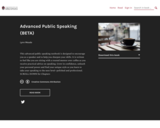
Short Description:
This advanced public speaking textbook is designed to encourage you as a speaker and to help you sharpen your skills. It is written to feel like you are sitting with a trusted mentor over coffee as you receive practical advice on speaking. Grow in confidence, unleash your personal power and find your unique style as you learn to take your speaking to the next level--polished and professional. SCROLL DOWN for Chapters
Word Count: 183127
(Note: This resource's metadata has been created automatically by reformatting and/or combining the information that the author initially provided as part of a bulk import process.)

American Literature I (1650–1860) examines significant literary works of early American and Puritan literature, the Enlightenment, American Romanticism, and pre-Civil War era. The course includes primary texts (many accompanied by video/audio options), historical background, literary criticism and interpretation, and instruction on writing about literature.
This course was developed by Anne Eidenmuller from Columbia Basin College with contributing work from Lumen Learning.

This is a resource designed to accompany a course on American Literature II. It has been found to be appropriate for California Community College courses with the following C-ID: ENGL 135
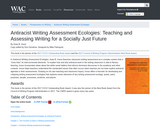
In Antiracist Writing Assessment Ecologies, Asao B. Inoue theorizes classroom writing assessment as a complex system that is "more than" its interconnected elements. To explain how and why antiracist work in the writing classroom is vital to literacy learning, Inoue incorporates ideas about the white racial habitus that informs dominant discourses in the academy and other contexts. Inoue helps teachers understand the unintended racism that often occurs when teachers do not have explicit antiracist agendas in their assessments. Drawing on his own teaching and classroom inquiry, Inoue offers a heuristic for developing and critiquing writing assessment ecologies that explores seven elements of any writing assessment ecology: power, parts, purposes, people, processes, products, and places.
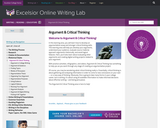
In this learning area, you will learn how to develop an argumentative essay and stronger critical thinking skills. This learning area will help you develop your arguments, understand your audience, evaluate source material, approach arguments rhetorically, and avoid logical fallacies. Here, you’ll also learn about evaluating other arguments and creating digital writing projects related to your argument.
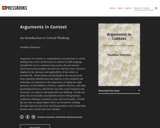
An Introduction to Critical Thinking
Short Description:
Arguments in Context is a comprehensive introduction to critical thinking that covers all the basics in student-friendly language. Intended for use in a semester-long course, the text features classroom-tested examples and exercises that have been chosen to emphasize the relevance and applicability of the subject to everyday life. Three themes are developed as the text proceeds from argument identification and analysis, to the standards and techniques of evaluation: (i) the importance of asking the right questions, (ii) the influence of biases, cognitive illusions, and other psychological factors, and (iii) the ways that social situations and structures can enhance and impoverish our thinking. On this last point, the text includes sustained discussion of disagreement, cooperative dialogue, testimony, trust, and social media. Overall, the text aims to equip readers with a set of tools for working through important decisions and disagreements, and to help them become more careful and active thinkers.
Long Description:
Arguments in Context is a comprehensive introduction to critical thinking that covers all the basics in student-friendly language. Intended for use in a semester-long course, the text features classroom-tested examples and exercises that have been chosen to emphasize the relevance and applicability of the subject to everyday life. Three themes are developed as the text proceeds from argument identification and analysis, to the standards and techniques of evaluation: (i) the importance of asking the right questions, (ii) the influence of biases, cognitive illusions, and other psychological factors, and (iii) the ways that social situations and structures can enhance and impoverish our thinking. On this last point, the text includes sustained discussion of disagreement, cooperative dialogue, testimony, trust, and social media. Overall, the text aims to equip readers with a set of tools for working through important decisions and disagreements, and to help them become more careful and active thinkers.
Word Count: 96327
(Note: This resource's metadata has been created automatically as part of a bulk import process by reformatting and/or combining the information that the author initially provided. As a result, there may be errors in formatting.)
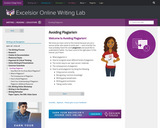
We know you have come to this tutorial because you are a serious writer who wants to write well — and correctly! You have probably heard the word plagiarism and would like to understand it better. You have come to the right place. In this tutorial, you’ll learn:
What plagiarism is
How to recognize seven different kinds of plagiarism
The correct way to use ‘open access’ materials
The consequences of plagiarism
How to avoid plagiarism by doing the following:
Citing sources correctly
Recognizing ‘common knowledge’
Writing good paraphrases
Writing good summaries
Taking careful notes
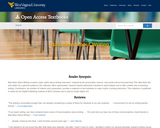
Bad Ideas About Writing counters major myths about writing instruction. Inspired by the provocative science- and social-science-focused book This Idea Must Die and written for a general audience, the collection offers opinionated, research-based statements intended to spark debate and to offer a better way of teaching writing. Contributors, as scholars of rhetoric and composition, provide a snapshot of and antidotes to major myths in writing instruction. This collection is published in whole by the Digital Publishing Institute at WVU Libraries and in part by Inside Higher Ed.

Basic Reading and Writing builds a solid foundation around core aspects of the writing process: critical reading; methodical writing; research and documentation; practical grammar and punctuation. An optional module introduces core principles for college success that help students understand and develop good habits to improve their performance in this and other college courses. As the first in a three-course sequence that culminates in Composition I (college-level composition), Basic Reading and Writing focuses on helping students identify and apply foundational concepts and skills in reading and writing. Course content may be used for standard instruction or diagnostically to discover and address gaps in student understanding/skill.

The University of North Georgia Press and Affordable Learning Georgia bring you Becoming America: An Exploration of American Literature from Precolonial to Post-Revolution. Featuring sixty-nine authors and full texts of their works, the selections in this open anthology represent the diverse voices in early American literature. This completely-open anthology will connect students to the conversation of literature that is embedded in American history and has helped shaped its culture.
Becoming a Confident Reader focuses on the essential skills and practices needed upon entering the first semester of college composition, either with or without a co-requisite support course. Students will learn to build and maintain resilience as a student, apply an effective reading process to college texts, and summarize and respond to academic writing. Thematic readings are included for practice. Extension activities provide opportunities for making connections, conducting basic research, analyzing the techniques authors use in their writing, and evaluating the use of sources in a text. This text is appropriate for a developmental English course that is a pre-requisite to the first semester of composition.

This book collects student essays on short stories written for English 211, Literary Analysis.

Covers processes and fundamentals of writing expository essays, including structure, organization and development, diction and style, revision and editing, mechanics and standard usage required for college-level writing.
This project was funded by a grant from the Higher Education Coordinating Commission in Oregon, a grant that ran from July 1, 2016 to June 30, 2017. The text of the book is complete (though, in the way of these things, still evolving), but moving it online is still in progress. The chapters available here are ready to be used or copied; additional chapters will be added during the summer of 2017 as the conversion and final copy edits are completed.
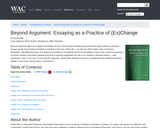
Beyond Argument offers an in-depth examination of how current ways of thinking about the writer-page relation in personal essays can be reconceived according to practices in the care of the self — an ethic by which writers such as Seneca, Montaigne, and Nietzsche lived. This approach promises to reinvigorate the form and address many of the concerns expressed by essay scholars and writers regarding the lack of rigorous exploration we see in our students' personal essays — and sometimes, even, in our own. In pursuing this approach, Sarah Allen presents a version of subjectivity that enables productive debate in the essay, among essays, and beyond.
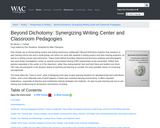
How closely can or should writing centers and writing classrooms collaborate? Beyond Dichotomy explores how research on peer tutoring one-to-one and in small groups can inform our work with students in writing centers and other tutoring programs, as well as in writing courses and classrooms. These multi-method (including rhetorical and discourse analyses and ethnographic and case-study) investigations center on several course-based tutoring (CBT) partnerships at two universities. Rather than practice separately in the center or in the classroom, rather than seeing teacher here and tutor there and student over there, CBT asks all participants in the dynamic drama of teaching and learning to consider the many possible means of connecting synergistically.
This book offers the "more-is-more" value of designing more peer-to-peer learning situations for developmental and multicultural writers, and a more elaborate view of what happens in these peer-centered learning environments. It offers important implications—especially of directive and nondirective tutoring strategies and methods—for peer-to-peer learning and one-to-one tutoring and conferencing for all teachers and learners of writing.
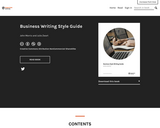
In light of the cost of textbooks and education in general, we undertook this project to create a free resource to be used broadly by students in a business context. We wanted to provide comprehensive coverage of the writing process, but keep our topics relevant to business education. We hope that this textbook provides equal value to both non- and native-English learners alike. Just like we acknowledge that students will continue to develop their writing skills, we expect this project to challenge and further our own skills as writers.

This book is organized into 9 parts, each based on a larger topic that students have chosen to study and write research papers on. Each part contains several short student papers, around 2,000 words each, exploring a different aspect of COVID-19 that relates to science, technology and society. Students were asked to examine their topics through research, gathering primary and secondary sources, both peer reviewed and non-peer reviewed to support their arguments. They were also encouraged to apply several theories often used in studies of Science, Technology and Society, including Actor-Network Theory, Path Dependence, Social Construction and Tragedy of the Commons to their topics. Students were given an introduction to these theories in the course, and they were asked to discuss how one or more of the theories applies and helps to better understand their paper topics. Some students also engaged in additional research on these theories to explore their applicability. Taking advantage of the e-book format, student also used Creative Commons and public domain images, which are not restricted by copyright limitations to help illustrate their points. In addition to their individual chapters, students also worked together to write introductions for different parts of the book. These part introductions contain a brief summary by the students on why they chose to write on a specific larger topic and how their individual chapters relate to the topic. They also give students an opportunity to reflect on how COVID-19 and its impact on the larger topic they are writing about has affected their personal lives.

Textbook for English Composition courses at Cameron University, including for Developmental Writing, Supplemental Writing Instruction, English Composition I, and English Composition II. Material covers basic writing skills and conventions of academic writing, as well as specific sections devoted to the major assignments in CU composition curriculum: narrative essays, critical thinking, rhetorical analysis, research and argumentation, and reflective writing. Includes student examples by winners of the CU Write essay contests.